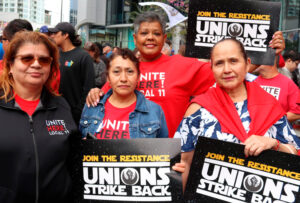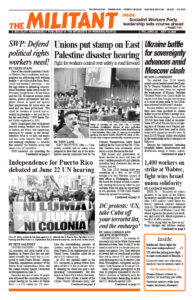OBERLIN, Ohio — “The sweeping indictment of Donald Trump under the Espionage Act by President Joseph Biden’s Justice Department is another step along the course the Democratic Party has been pressing for seven years of criminalizing political opposition and debate,” Jack Barnes, national secretary of the Socialist Workers Party, said at a June 12 expanded meeting of the party’s Political Committee. The meeting set the political line for the SWP’s work coming out of an International Educational Conference here June 8-10.

“A section of the capitalist ruling class is pushing for a showdown targeting Trump and his supporters, actions that must be opposed by all defenders of constitutional rights in this country.” No matter who the immediate victim, the SWP leader said, the rulers’ assaults on freedoms protected by the U.S. Constitution will inevitably be directed against working people, including the trade unions and political organizations of the working class and oppressed.
During the three-day SWP educational conference, 333 people from seven countries joined wide-ranging discussions on communist program, continuity and activity in plenary reports, classes and a closing event highlighting opportunities in front of the communist movement today (see article). Participants included members and supporters of the SWP, Communist Leagues in Australia, Canada and the U.K., as well as participants from elsewhere in the world.
In addition to defense of constitutional freedoms, the report by the party’s national secretary adopted by the June 12 leadership meeting focused on:
- The centrality of organizing solidarity through the unions with workers on strike, engaged in unionization drives, and conducting other struggles to defend wages, sustainable hours and schedules, and safe job conditions.
- Why advancing women’s emancipation cannot be reduced to the fight for the decriminalization of abortion. At the center of ending women’s second-class status is the struggle by working people to be able to start and sustain families amid capitalist conditions in which steady employment at wages sufficient to do so is less and less available. Especially in face of today’s rising costs of food, housing, child care, medical care and other basic needs.
- The necessity of a proletarian internationalist course. One that presents a working-class foreign policy placing the interests of workers and farmers here and worldwide above the profit-driven conflicts and wars between the U.S. rulers and their capitalist competitors.
- Why the unions must lead in forging an alliance of workers and exploited farmers struggling to escape debt slavery imposed by banks and giant businesses dominating production of farm implements, seed, fertilizer, pesticides and other inputs. The report reaffirmed the SWP’s longstanding call for nationalization of the land to combat the ruinous results of capitalism’s rents and mortgages system.
- Why achieving any of these goals requires the working class and trade unions to break from the Democrats, Republicans and other parties of the exploiters and oppressors and forge a politically independent labor party based on the unions, the basic defense institutions of the working class.
- Advancing the revolutionary fight by the working class to remove state power, including the power to make war, from the ruling class and to establish a workers and farmers government that, as the SWP Constitution says, “will abolish capitalism in the United States and join in the worldwide struggle for socialism.”
SWP’s defense of political rights
The SWP is well-prepared to explain the stakes for working people in opposing the federal government’s political witch hunt driven by the Biden administration, Barnes said.
The opening paragraph of the resolution adopted by the December 2022 SWP convention states: “Defending and extending the freedoms protected by the US Constitution is at the center of the class struggle today. Workers and farmers must organize and act to prevent the federal government’s assault on these freedoms. … We must oppose the US rulers’ relentless drive to refurbish the reputation and expand the use of the government’s political police, first and foremost the FBI.” That resolution is in the book published by Pathfinder Press earlier this year, The Low Point of Labor Resistance Is Behind Us: The Socialist Workers Party Looks Forward by Barnes, Mary-Alice Waters and Steve Clark.
Since the party’s founding in 1919, SWP members have “distinguished ourselves as principled and uncompromising defenders of all victims of government frame-ups,” Barnes said.
The same espionage statute wielded by Biden against Trump was used in 1918 to jail Socialist Party leader Eugene Debs for his support for the Bolshevik-led Russian Revolution and opposition to U.S. imperialism’s predatory aims in World War I.

Imagine Trump running for president from federal prison, as Debs did in 1920, Barnes said. It could happen.
He urged members and supporters of the party to refresh their knowledge of that history, noting that some 23 years after Debs was locked behind bars, and, just a week after Imperial Japan’s bombing of Pearl Harbor, the banner headline in the Dec. 13, 1941, Militant read “War reinstates 1917 Espionage Act.” The same issue of the working-class newsweekly reported President Franklin Roosevelt’s declaration that U.S. soldiers were to be sent to fight and die in the second imperialist world slaughter, both on the Atlantic and Pacific fronts. And that issue also covered the sentencing to federal prison of 18 leaders of the SWP and the Teamsters union, targeted for organizing opposition in the labor movement to Washington’s war drive.
Barnes reminded the leadership meeting of the infamous Feb. 9, 1950, West Virginia speech by U.S. Sen. Joseph McCarthy during which he waved a piece of paper and claimed, “I have here in my hand a list of 205” names of “members of the Communist Party and members of a spy ring” working for the State Department. McCarthy’s redbaiting witch hunt was like that from beginning to end, offering no evidence about the so-called traitors. Meanwhile, thousands were fired from jobs and had lives destroyed by means of venomous innuendo.
Barnes recalled that in 1973 the SWP filed a federal lawsuit to halt the FBI’s decadeslong spying and harassment against the party and Young Socialist Alliance. After a 15-year political fight waged by the party, winning ever-broader support, Federal District Judge Thomas Griesa ruled that the FBI’s use of undercover informers, repeated break-ins of party offices, and instigation of firings, evictions, and other persecution of party members and supporters were “violations of the constitutional rights of the SWP.” Truly a victory for all working people and the oppressed.

Barnes pointed to a recent Militant Labor Forum in Los Angeles responding to the Justice Department’s assaults on constitutional freedoms as an example to be emulated of how this party institution can be used. The event featured SWP leader Norton Sandler and members of the African People’s Socialist Party, whose members face frame-up indictments for acting as unregistered “foreign agents” of Moscow. The forum and others like it elsewhere have an important part to play in broadening opposition to such government attacks. (See “Los Angeles Militant Labor Forum panel discusses fight for constitutional rights” in July 3 issue of the Militant.)
Crises across world capitalist order
In his report to the SWP leadership meeting, Barnes reviewed the international situation confronting Washington, the world’s last great imperialist power. Efforts by the U.S. rulers to maintain their massive military might and predominant but relatively diminishing economic supremacy intensify the exploitation of working people everywhere on earth, accelerating capitalism’s global disorder and dangers of world war.

World politics today is marked by the Kremlin’s determination to expand its borders by force of arms and crush the national independence and sovereignty of Ukraine. Beijing’s rulers, still heavily dependent on trade, credit and investment from U.S., European, and Asian finance capital, at the same time continue to press their goal of establishing themselves as the economic and military powerbroker in the Pacific.
Instead of the expanding investment, trade and rising profits many imperialist ruling figures anticipated with the end of pandemic lockdowns, Barnes said, the bosses face stagflation and sharpening competition for markets. That, in turn, leads them to inflict more and harsher assaults on the living and working conditions of workers, farmers and other toiling producers the world over.
Rival capitalist states and ruling classes are stepping up moves to reset alliances and rearm in preparation for coming military conflicts in the wake of Moscow’s war against Ukraine. Long an ally of Washington, the Saudi monarchy is seeking closer ties with the rulers in China, announcing it will attend the August BRICS summit convened by the governments of Brazil, Russia, India, China and South Africa.
And the expansionist aims and drive to develop a nuclear arsenal by the bourgeois clerical regime in Iran threaten ongoing conflagrations across Iraq, Syria, Lebanon and beyond. These policies are made even more menacing by Tehran’s declared aim of eliminating the existence of Israel.
Barnes pointed to the global media blitz Washington has begun cranking up, alleging Chinese government spying operations in Cuba — charges Cuban leaders rebutted as “mendacious and unfounded” lies. Such false charges, the SWP leader said, are in line with the Biden administration’s course — building on that of the Trump White House and every Democratic and Republican administration for some 65 years — to overturn the socialist revolution in Cuba.
The aim of this brutal policy, as the 2022 SWP resolution explains, “is to crush the spirit of Cuba’s working people, their socialist revolution, and the example of working-class leadership and revolutionary intransigence they set for toilers in the United States, across the Americas, and worldwide.”
Crisis of affordable family formations
The starting point in the battle for women’s emancipation, Barnes said, is recognizing and addressing the growing social and economic crises that prevent working people starting families and providing for them. That means fighting for jobs with wage rates, work schedules and conditions that make family time possible — time for social activity together, sports, recreation, caring for children who are sick or need help with their homework, help for the aging. Time for family members to read, to take part in union, political and cultural activity.
This is a fight that must be led by the labor movement, above all.
The destructive consequences of the tearing apart of families in the Black community were detailed in the 1960s by Daniel Patrick Moynihan, then a Labor Department official and later U.S. senator from New York. Today this reality is increasingly the plight of workers of all skin colors, languages and national origins in North America.
This was recently captured by a picket sign carried by locked-out dockworkers in Quebec last fall, one that rings true to tens of millions of workers and their families facing the bosses’ relentless drive for profits: “Longshore workers wanted. No spouses. No kids. No friends. Available 24/7, 365.”

Advancing a working-class program to combat capitalism’s twin scourges of joblessness and soaring prices, for universal child care and medical care, is central to opening the road to women’s equal participation in economic, social and political life. As is addressing the broader, family-destroying social and moral crises spawned by decaying capitalism — opioids and other deadly drugs, alcoholism and gambling, as well as growing mental illness, suicides, domestic violence and crime.
The political course pursued by Democrats, the middle-class left and leaders of today’s bourgeois-minded women’s organizations, however, heads in the opposite direction, Barnes said. They reduce the fight for women’s rights to abortion access, campaigning for capitalist (almost always Democratic Party) politicians and “breaking the glass ceiling” to get more women into well-remunerated professional and managerial positions.
The communist movement must campaign for the labor movement to advance a political course that promotes affordable family formation for the working class and other exploited producers. That’s our course as the party of life.
That’s our programmatic continuity with the socialist revolutions in Russia and Cuba, both in the living example they set and by way of the writings of V.I. Lenin, Leon Trotsky, Fidel Castro, Vilma Espín, and other communist leaders. As those examples have shown in practice, the family will remain a necessary social institution for working people well past a successful socialist revolution, Barnes emphasized.
Following the conquest of power by workers and farmers in Russia and Cuba, amid the rising confidence of both women and men in the working classes, there was a sharp rise in birth rates. That contrasts with today’s drop in much of the world to levels that, if not reversed, leads to declining population.
In the aftermath of both revolutions, millions of women were drawn into participation and revolutionary leadership in all aspects of economic, social and political life. Decriminalization of abortion was established along the road of these revolutionary working-class struggles, Barnes said.
Deepening work in the unions

Alongside fellow workers and trade unionists, SWP members are deepening their involvement in labor struggles today and maximizing opportunities to build and expand solidarity. That union-building activity is open to all party members, Barnes said, as presented in the party’s 2022 resolution.
Organizing solidarity is the backbone of work to strengthen the unions. Barnes pointed to the recent example of eight rail workers, all members of SMART-TD Local 1373, joining the picket line of striking Teamsters at Liberty Coca-Cola Beverages in Philadelphia last month. They brought several hundred dollars to donate to the strike fund.

It’s in the course of such fights that workers become more and more receptive to immediate, democratic and transitional demands advanced in the communist program, pointing the way forward in addressing today’s conditions.
Demands for cost-of-living adjustments in all wages and benefits to combat price hikes.
For a union-led fight for 30 hours work for 40 hours pay, to combat layoffs by spreading the work around with no cut in take-home pay.
For workers control of production and access to capitalist “business secrets,” to combat profit-driven speedup and dangerous conditions both on the job and victimizing working people and others far and wide — as we’ve seen in the derailment and toxic consequences in East Palestine, Ohio, as well as other workplace-related disasters too numerous to recount. Unions must be at the center of battles for control over conditions affecting the health, safety and futures of millions of working people.

The SWP also campaigns for the labor movement to build solidarity with farmers’ struggles in face of sharply rising input prices, debt slavery and bank foreclosures on land, buildings and equipment. We do so as we explain our working-class program, including the need for land nationalization to block extortionate land grabs and “repo” forays by banks and large real estate firms.
Working farmers are organized through the bourgeois parties and candidates to look to handouts from government legislative bodies and agencies as the only way to survive, Barnes said. “Many farmers will become open to a different course, a working-class course, as they confront the growing prospect they’ll be driven off the land and into the ranks of wage labor.”
Through workers’ experiences shoulder to shoulder in such struggles, growing numbers will learn the need to break from the political parties of the bosses, Barnes said. They can be won to the course of building a labor party based on the unions to fight for the interests of the working class and all the exploited and oppressed in the U.S. and the world over.
Renewal of communist leadership
The socialist revolution in Cuba and the forging of a communist leadership there had a momentous impact on the Socialist Workers Party, Barnes said. It convinced new generations of revolutionary-minded working people and youth worldwide that proletarian leadership of the highest caliber would continue to emerge, capable of organizing workers and farmers to take power out of the hands of the capitalist rulers.
Huge crowds greeted Fidel Castro as he led the more-than-weeklong Freedom Caravan across Cuba after the revolutionary victory of January 1, 1959, when U.S.-backed dictator Fulgencio Batista fled the country. Most weren’t members of the Castro-led July 26 Movement, Barnes said, but they were looking to join in making the revolution.
As Castro said a few years after the triumph, he saw “hundreds and thousands of men and women with the red and black uniforms of the July 26 Movement. But many thousands more wore uniforms that weren’t black and red but were the work shirts of workers and farmers and other men and women of the people. … They are the strength, the backbone of the revolution! Fist, arm, muscle of the revolutionary people, of the working class, of the peasants, of the workers!”
Like Lenin and the Bolsheviks decades earlier, Castro recognized that making a revolution requires organizing and leading the millions of the exploited and oppressed to take their destinies into their own hands. Castro declared from the outset that the new revolutionary government would draw them into the struggle. And it did.
With the expulsion of the last bourgeois figures from the cabinet by fall 1959, a workers and farmers government led by Castro was well on the way to leading the working class — amid hostile confrontations initiated by both U.S. imperialism and Cuban landlords and capitalists — to the eradication of bourgeois property relations and establishment of a workers state in late summer and fall 1960. In the words of our movement’s 1938 founding program drafted by exiled Bolshevik leader Leon Trotsky, Cuba’s revolutionary-led workers and farmers government was, and could only have been, “a short episode on the road to the actual dictatorship of the proletariat.” The working class had to take power, or the revolution would be defeated.
These lessons are well recounted in Dynamics of the Cuban Revolution by SWP leader Joseph Hansen; books such as Cuba and the Coming American Revolution and Their Trotsky and Ours, and others by Barnes; as well as some 50 titles on the Cuban Revolution published by Pathfinder Press, books by Fidel Castro, Che Guevara and other communist leaders, many of them edited by Mary-Alice Waters.
Recognizing the historic accomplishment registered by the Cuban Revolution politically armed the SWP leadership with a clearer understanding of the successes and failures of other post-World War II revolutionary struggles — from the Stalinist-led Yugoslav and Chinese overturns in the late 1940s, through the revolutionary-led uprisings in Nicaragua and Grenada in the late 1970s and early 1980s.
The course of the Cuban leadership forged by Fidel Castro, Barnes said, explains why the socialist revolution there lives and fights to this day. Its emergence opened the door to the renewal of communist leadership beyond Cuba’s shores, setting an example to emulate for revolutionary working-class parties in the United States and worldwide.
By acting on this communist political continuity and the opportunities in the labor movement and beyond that register the small breeze lifting the class struggle today, SWP members are extending the party’s reach and winning fellow fighters to its ranks.


